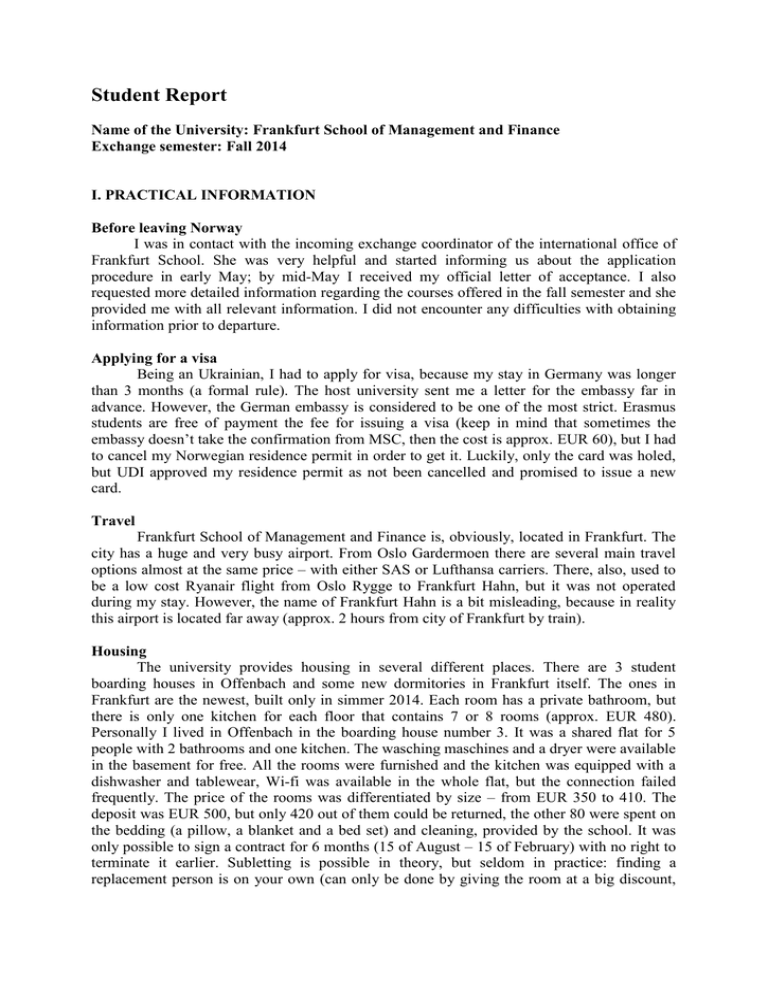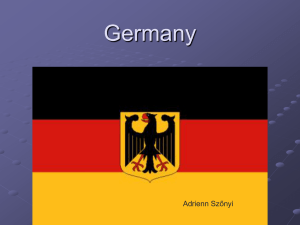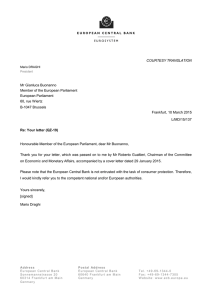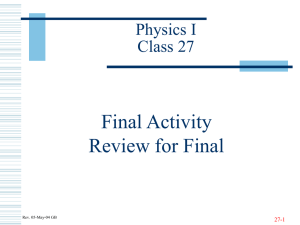Student Report
advertisement

Student Report Name of the University: Frankfurt School of Management and Finance Exchange semester: Fall 2014 I. PRACTICAL INFORMATION Before leaving Norway I was in contact with the incoming exchange coordinator of the international office of Frankfurt School. She was very helpful and started informing us about the application procedure in early May; by mid-May I received my official letter of acceptance. I also requested more detailed information regarding the courses offered in the fall semester and she provided me with all relevant information. I did not encounter any difficulties with obtaining information prior to departure. Applying for a visa Being an Ukrainian, I had to apply for visa, because my stay in Germany was longer than 3 months (a formal rule). The host university sent me a letter for the embassy far in advance. However, the German embassy is considered to be one of the most strict. Erasmus students are free of payment the fee for issuing a visa (keep in mind that sometimes the embassy doesn’t take the confirmation from MSC, then the cost is approx. EUR 60), but I had to cancel my Norwegian residence permit in order to get it. Luckily, only the card was holed, but UDI approved my residence permit as not been cancelled and promised to issue a new card. Travel Frankfurt School of Management and Finance is, obviously, located in Frankfurt. The city has a huge and very busy airport. From Oslo Gardermoen there are several main travel options almost at the same price – with either SAS or Lufthansa carriers. There, also, used to be a low cost Ryanair flight from Oslo Rygge to Frankfurt Hahn, but it was not operated during my stay. However, the name of Frankfurt Hahn is a bit misleading, because in reality this airport is located far away (approx. 2 hours from city of Frankfurt by train). Housing The university provides housing in several different places. There are 3 student boarding houses in Offenbach and some new dormitories in Frankfurt itself. The ones in Frankfurt are the newest, built only in simmer 2014. Each room has a private bathroom, but there is only one kitchen for each floor that contains 7 or 8 rooms (approx. EUR 480). Personally I lived in Offenbach in the boarding house number 3. It was a shared flat for 5 people with 2 bathrooms and one kitchen. The wasching maschines and a dryer were available in the basement for free. All the rooms were furnished and the kitchen was equipped with a dishwasher and tablewear, Wi-fi was available in the whole flat, but the connection failed frequently. The price of the rooms was differentiated by size – from EUR 350 to 410. The deposit was EUR 500, but only 420 out of them could be returned, the other 80 were spent on the bedding (a pillow, a blanket and a bed set) and cleaning, provided by the school. It was only possible to sign a contract for 6 months (15 of August – 15 of February) with no right to terminate it earlier. Subletting is possible in theory, but seldom in practice: finding a replacement person is on your own (can only be done by giving the room at a big discount, because almost nobody is interested in such a short period). You don’t need to pay any additional bills, e.g. for electricity or Internet, everything is included. The boarding house number 2 is in worse condition and is considered to be a party place. Although the dorms are easily reachable by direct lines of S-bahn (Offenbach – Markplatz station) and are not far away from the school (approx. 15-20 minutes), city center (20 minutes), main train station (25 minutes) and Frankfurt airport (35 minutes), Offenbach is perceived as not a very safe city, full of emigrants. There are, also, a supermarket and a shopping area nearby. For the students who prefer to find a private rental in a shared flat or studio, the following sites are widely popular: http://www.studenten-wg.de http://www.wg-gesucht.de http://www.zwischenmiete.de Keep it in mind that almost all advertisements are in German and you will have a greater chance of reply if you send e-mails in German. Costs My approximate monthly expenditure were as follows: Rent Books Food Transport Other NOK 3500 NOK 0 NOK 1800 NOK 300 NOK 900 All study materials are provided by the lecturers (detailed lecture slides are sufficient to prepare for the exams), so students don’t need to buy books. The student semester travel card is approx. EUR200 and is valid for 6 months. Students are not allowed to buy a ticket on a month-by-month basis. Food from supermarkets is quite cheap compared to Norway; a meal in the university canteen is approx. 40 NOK, coffee 8 NOK. Culture and language At the university English is widely spoken among faculty and students, so I had no language constraints. In general, Frankfurt is pretty international city and it is possible to ‘survive’ only with English but knowing a bit of German is very helpful (especially if you live in Offenbach). Frankfurt is a big transport node. You can explore Germany with several options: - By train. Deutsche Bahn offers attractive prices for high-speed trains if you book in advance, or there are also special promotional tickets for a group of up to 5 people on regional trains – EUR 44 for one day. - By bus. The prices are much cheaper than for trains and the service is good, but sometimes there are significant delays. https://www.busliniensuche.de/ shows all the travel destinations by different competing companies. - Sharing a car. http://www.blablacar.de/ Visiting Berlin and Munich is a must. But I would also recommend small old cities in Hessen – Marburg am Lahn, Limburg am Lahn, Heidelberg (in Baden-Württemberg). II. ABOUT THE SCHOOL The school is located in the nice area closely to the river and in walking distance from the city center. The building is quite small. It has only 2 studying blocks, a small library located on 2 floors and a block for educational and administrative staff. There is an internal garden with a fontain surrounded by those mentioned buildings. Student café has a view into the garden. The school is building a new campus, but it will be ready only in 2016. In my opinion, there are not enough studying places in the library, and the number of group rooms is also limited. Course registration The initial course registration took place one week prior the introduction week through filling a form and sending it back to school. After that it was checked for any mismatches by academic advisors. The school gives the students a freedom to combine studying with working. For this purpose the courses are divided into blocks, which are offered either for Monday-Tuesday-Saturday or Thursday-Friday-Saturday studying days. On Wednesdays the German courses are running. Add/drop period normally ends two weeks after the particular course has started. And not all of the courses start from the beginning of semester. The concentration courses normally start in September and the examinations are in the beginning of November. After that electives start with ending in mid-December. Exams normally go in clusters without any or just one-day break between them. Academic calendar Arrival date: First day of the semester: Last day of classes: Examination period: Any special events/holidays: Other: 25.08.2014 28.08.2014 13.12.2014 03-08.11.2014 15-20.12.2014 Octoberfest 20.09.2014 – 05.10.2014 -------- Arrival After arrival two orientation days were arranged for exchange students with mandatory attendance (28-29.08.2014). During these days academic advisors tried to make us familiar with the school, library and key representatives from administration and student organizations, checked and sold insurance and discussed any other organizational questions. Some informal activities were also arranged. Among them: a dinner in the traditional German restaurant, paid by the school; round trip in the city with different tasks; barbeque and a hiking trip. The International Office The International office was always very helpful and fast in solving any kind of problems. They know each exchange student by name. Their written guidelines were easy to follow. Promoting BI and Norway We participated in the “Study in Europe” fair, made for the local students seeking for exchange opportunities. However, most of their students choose Asia, the US or South America as the destination points. Social activities Before the arrival each exchange student was paired with a buddy from Frankfurt School. They were supposed to pick you up from the airport and show around in the city. But not of them were actually available. The exchange students in the majority were from the Bachelor program. Far in advance we got a schedule of different activites planned for the whole semester: restaurant dinners, local trips, musical concerts, visiting museums, stock exchange, cider producer, ice-skating, Christmas market. We had a Facebook group, where an information was updated continuously. Two international dinners took place, where the students from the same country should have cooked their national dishes and treat the others. For one of them EUR 100 was provided to cover expenses on drinks and ingredients. Some big celebrations were on campus as well – Indian Divali (Festival of light) and Octoberfest. Different one-day bus trips to other cities and countries were offered at a decent price, e.g. Strasbourg, Luxembourg, Brussels, Amsterdam, Dresden, etc. It was also possible to join some student organisation of your choice. They were introduced in the beginning of semester. For interested in learning German or other languages the school created a “Tandem program” – pairing with a student, who was a native speaker of a language of your choice. The German course was offered for free every week according to each level, giving an opportunity to get 6 ECTS (however, was approved only as a free elective by BI, meaning no credits will be recognised). Our German teacher voluntarily invited us to his home city for a Christmas market, which I find a very nice gesture. III. ACADEMICS In the classroom I found the courses more practical and interactive compared to BI. We often discussed case studies and had to prepare presentations. The teachers cover the most current topics in finance, e.g. Basel III regulation, and provide us with up-to-date figures (Q3 2014). All my lecturers have strong industry experience - from Investment Banking, Private Equity and alternative asset management, and teach only part-time. The workload is not higher compared to BI. The problem is that the courses are taught for a much shorter period (max 8 weeks, for electives – 5 weeks only), and are therefore more intensive. Course materials For all courses students are given detailed lecture slides (also hard copies), which are sufficient for study material. Normally, teachers recommend other literature as well- books and articles, but material from textbooks is not covered on the exam. Exams Exams are based entirely on the lecture slides and perhaps on some discussion points in class. For 3 out of the 4 courses I took, presentation was part of the final grade. Group work of 4-5 students is normal. There are no mid-term exams or small quizzes/ continuing evaluation during the semester; only final exam and/or presentation or paper. Class attendance is not mandatory but is strongly recommended since discussion in class may be useful for the final examination. Once, we also had a guest lecturer from Barclays in the Debt Capital Markets class. Towards the end of the semester, students are normally given a mock exam which is very similar to a real one in terms of structure and level, and is very helpful for preparation. Exams are shorter compared to BI – 2 hours max. Good presentation skills and group work are essential in Frankfurt School. For some courses I took (Liquidity Risk, Alternative Investments), the final grade is based on presentation only (no supplement paper). Library and technology The library is extremely small and the number of project rooms is limited. It is better if students bring their own laptop since there are just a few computers available. There is one computer room with access to the Bloomberg terminal (6-7 computers) and Thomson Reuters. During the orientation days we had a short guide in the library; in my opinion the library staff is friendly and willing to help. Description of courses Course code & name Master/ Bachelor Master Exam form Prerequisite s None Approved as Comments Operational and Liquidity Risk Master 1 presentation for Liquidty Risk (50%) and 1 paper for Op Risk (50%) None Major Renewable Energy Finance Master None Major Master 1.5h written exam (70%) and presentation (30%) 1 presentation for Alternative Investments (50%) and 1h exam for PE (50%) Alternative Investments & Private Equity None Major Financial Instruments Accounting Master 2-hour written exam None Elective Credit Risk Default Models & Credit Derivatives German Master 2-hour written exam None Major --- Midterm, Final oral and written exam From A1/1 and further according to the last level achieved Elective Debt Capital Markets 2-hour written exam Major Interesting course, not too demanding Focus a lot on regulation (Basel III). Liquidity Risk was a crash course; the presentation was in group of 7-8 students! Not too technical For Alternative Investments we had an oral examination – presentation + extra questions from the lecturers. Concentration on IAS 39 and IFRS 9 Demanding, but the exam was affordable Once per week for 3 hours Overall, the semester in Frankfurt added value to my academic and cultural life. The choice of courses is wide, the study program is flexible and students have opportunities for part-time jobs or internships. Up to my belief, my stay in Frankfurt has enhanced my career possibilites and I strongly recommend it to future students.



